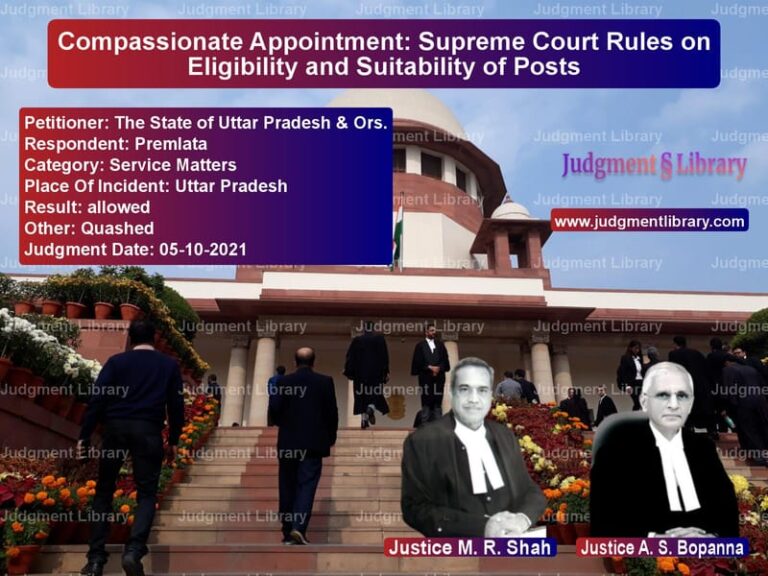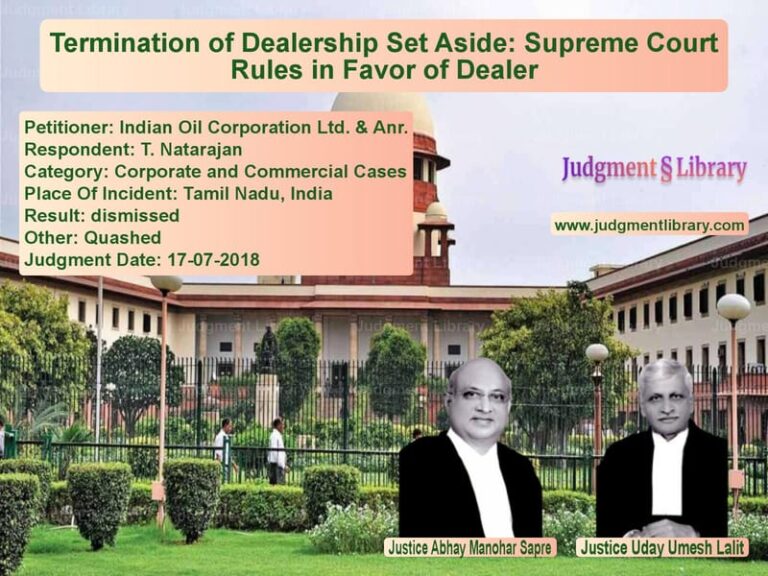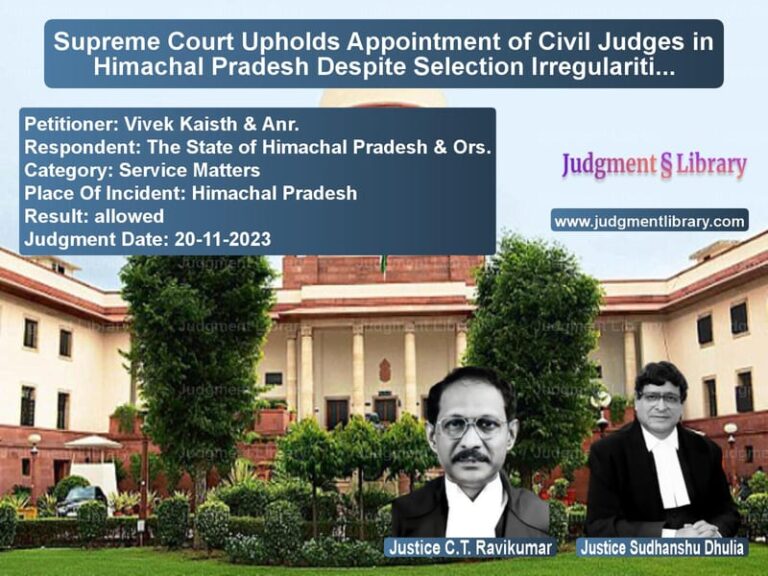Supreme Court Upholds Royalty Charges on Captive Hydroelectric Projects in Kerala
The Supreme Court of India recently ruled on a significant dispute involving royalty charges on captive hydroelectric projects in Kerala. The case, involving M/s. Indsil Hydro Power and Manganese Limited (INDSIL) and Carborundum Universal Limited (CUMI) against the State of Kerala, addressed the legality of levying royalty and controlled water release charges on private power producers. The judgment sheds light on the contractual obligations of private entities utilizing state-controlled natural resources and establishes a precedent for similar disputes in the future.
Background of the Case
The Government of Kerala introduced a policy in 1990 allowing private agencies and public undertakings to establish hydel schemes for power generation. The policy required private power producers to adhere to government-imposed conditions, including paying royalties and other applicable charges for using water resources.
Carborundum Universal Limited (CUMI) and Indsil Hydro Power and Manganese Limited (INDSIL) established hydroelectric projects under this policy:
- CUMI set up the Maniyar Hydroelectric Project (12 MW) in Kerala, utilizing controlled water releases from the Sabarigiri and Kakkad Hydro Electric Projects.
- INDSIL constructed the Kuthungal Hydroelectric Project (21 MW), benefiting from controlled releases from the Anayirankal Dam.
Both companies entered into agreements with the Kerala State Electricity Board (KSEB), accepting the terms stipulated in the 1990 policy, including paying a royalty for water usage. However, they later challenged the government’s imposition of charges, arguing that they were discriminatory and unconstitutional.
Legal Challenge
Petitioners’ Arguments
Both CUMI and INDSIL contested the royalty charges, raising several key arguments:
- The agreements they signed did not explicitly include a royalty clause, and the state government arbitrarily imposed the charges later.
- Similar hydroelectric projects were not subjected to such charges, making the levy discriminatory and in violation of Article 14 of the Indian Constitution.
- The projects utilized natural river flows and not controlled releases, and thus, they should not be charged for controlled water use.
- Even if controlled releases were involved, only a portion of the generated power (22.54% in the case of INDSIL) depended on controlled releases. Therefore, a blanket royalty on total power generation was unreasonable.
State Government’s Arguments
The Kerala government and KSEB defended the royalty charges, arguing:
- The agreements signed by CUMI and INDSIL explicitly incorporated the 1990 policy, which required payment of water royalties.
- Controlled water releases from reservoirs ensured consistent power generation for these projects, providing a clear advantage.
- The royalty was not a tax but a contractual obligation, arising from the privilege of utilizing state-controlled water resources.
- The policy aimed to prevent private companies from gaining an undue advantage from state-owned infrastructure.
- Independent Power Producers (IPPs) were exempted from such charges because they sold power to KSEB, while Captive Power Producers (CPPs) like CUMI and INDSIL used the power for their own consumption.
Supreme Court’s Analysis and Judgment
The Supreme Court, in a detailed ruling, upheld the royalty charges imposed by the Kerala government. The court’s key observations were:
On Contractual Obligation
“The agreements signed by INDSIL and CUMI incorporated the 1990 policy, which contained provisions for royalty charges. Having accepted the terms, they cannot now claim exemption.”
The court emphasized that agreements voluntarily entered into by private parties must be upheld, and businesses cannot later challenge terms they previously accepted.
On the Nature of Royalty
“The royalty is not a tax but a payment for the privilege of using controlled water resources. It arises from contractual obligations, not statutory imposition.”
The court clarified that royalty payments were compensation for an advantage provided by the government and not a general tax on power production.
On Discrimination Claims
“The distinction between CPPs and IPPs is rational. CPPs generate power for self-use, while IPPs contribute to the state grid. Imposing royalty on CPPs while exempting IPPs serves the public interest by keeping consumer electricity prices lower.”
The judgment rejected the claim that the charges were discriminatory, stating that the government had a legitimate policy reason for differentiating between captive and independent power producers.
On Controlled Release of Water
“The controlled release of water provides a tangible benefit to these projects, ensuring consistent power generation. Levying charges for this advantage is justified.”
The court held that even though CUMI and INDSIL claimed to use natural river flows, the evidence showed they benefited from controlled water releases, justifying the royalty charges.
Implications of the Judgment
The Supreme Court’s ruling has far-reaching implications for power producers in India:
- Reinforces contractual obligations: Private companies must honor agreements they sign, even if they later find the terms unfavorable.
- Clarifies royalty vs. tax distinction: The ruling confirms that royalty charges for resource use are contractual payments, not government-imposed taxes.
- Justifies different treatment of CPPs and IPPs: The court upheld the government’s rationale for imposing royalties on captive power producers while exempting those selling power to the grid.
- Precedent for future cases: This decision strengthens the government’s ability to impose royalties on private entities using state-controlled resources.
Conclusion
The Supreme Court’s judgment in the CUMI and INDSIL cases upholds the Kerala government’s right to levy royalty charges on private hydroelectric projects benefiting from controlled water releases. By distinguishing between captive and independent power producers and reaffirming the contractual nature of royalty payments, the ruling establishes a crucial legal precedent. Power producers operating under similar agreements must now carefully evaluate their contractual obligations, as this decision underscores the enforceability of state-imposed royalty conditions.
Petitioner Name: M/s. Indsil Hydro Power and Manganese Limited.Respondent Name: State of Kerala and Others.Judgment By: Justice Uday Umesh Lalit, Justice Vineet Saran.Place Of Incident: Kerala.Judgment Date: 06-09-2021.
Don’t miss out on the full details! Download the complete judgment in PDF format below and gain valuable insights instantly!
Download Judgment: ms.-indsil-hydro-po-vs-state-of-kerala-and-supreme-court-of-india-judgment-dated-06-09-2021.pdf
Directly Download Judgment: Directly download this Judgment
See all petitions in Contract Disputes
See all petitions in Education Related Cases
See all petitions in Judgment by Uday Umesh Lalit
See all petitions in Judgment by Vineet Saran
See all petitions in dismissed
See all petitions in supreme court of India judgments September 2021
See all petitions in 2021 judgments
See all posts in Civil Cases Category
See all allowed petitions in Civil Cases Category
See all Dismissed petitions in Civil Cases Category
See all partially allowed petitions in Civil Cases Category







